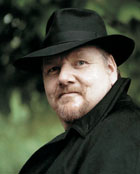|
|
|
[INDEX]
 The
Metropolitan Opera has suffered serious financial shortfalls since 9/11,
amounting to several million dollars per year, mainly blamable on reduced
ticket revenue. To stanch the bleeding this season, the Met went dark
from Jan. 10-25, 2005, the period of poorest sales. Making lemonade out
of lemons, the Met Orchestra scheduled three concerts at Carnegie Hall
during the month (Jan. 9, 23, 30), providing some of the best music to
be heard in New York all year. The
Metropolitan Opera has suffered serious financial shortfalls since 9/11,
amounting to several million dollars per year, mainly blamable on reduced
ticket revenue. To stanch the bleeding this season, the Met went dark
from Jan. 10-25, 2005, the period of poorest sales. Making lemonade out
of lemons, the Met Orchestra scheduled three concerts at Carnegie Hall
during the month (Jan. 9, 23, 30), providing some of the best music to
be heard in New York all year.
It is no secret that the MET Orchestra is the most reliable aspect of
any Metropolitan Opera production. Singers and sets and direction may
go awry, but the orchestra is almost always superb. So it is no surprise
to discover that when the MET Orchestra emerges from the pit to perform
on stage at Carnegie Hall, it delivers memorable music making. On January
23, the band offered a highly refined program to a packed house.
For me the draw was Canadian tenor Ben Heppner, fresh from a run of Otellos
at the Met, and in the middle of a packed season of recitals. Heppner
has been through several well-publicized vocal crises in the last few
years, characterized by dryness and cracking in mid-song. He seems to
have worked through these problems, and after drastic weight-loss (and
removal of goatee), has returned to his familiar hefty proportions and
facial hair.
 As
the soloist in Mahlerís Das Lied von der Erde he sounded better than I
have ever heard him. The voice was powerful, steady, and controlled, with
a rich timbre and smooth legato. Unlike in his past troubled times, there
was no sense of pinching or effort, none of the caponized sound of a voice
under harsh discipline. Only very briefly, on a couple of highish notes
and in a certain tricky transitional area, did his voice sharpen slightly.
But as if to defy the gods, he fearlessly bellowed Das Trinklied von Jammer
der Erde - and was heard over the orchestra. Elsewhere he was sweetly
lyrical, as in Von der Jugend. As
the soloist in Mahlerís Das Lied von der Erde he sounded better than I
have ever heard him. The voice was powerful, steady, and controlled, with
a rich timbre and smooth legato. Unlike in his past troubled times, there
was no sense of pinching or effort, none of the caponized sound of a voice
under harsh discipline. Only very briefly, on a couple of highish notes
and in a certain tricky transitional area, did his voice sharpen slightly.
But as if to defy the gods, he fearlessly bellowed Das Trinklied von Jammer
der Erde - and was heard over the orchestra. Elsewhere he was sweetly
lyrical, as in Von der Jugend.
Swedish mezzo Anne Sofie von Otter replaced the scheduled Lorraine Hunt
Lieberson in the other solo part. Von Otter had some of Mahler's loveliest
music to sing, and she did her best with it. But, sadly, her voice has
lost its former luster. All too often in Der Einsame in Herbst her high
notes were dry. In general, her voice was wan and thin, so that even the
long, heart-wrenching prose poem of Der Abschied was traversed without
evoking emotion or magic.
The real star of the evening was the Met Orchestra. In Das Lied,, Levine
elicited exquisite precision, a palette of apt colors and crystal clear
effects. How different from the Mahler offered by some orchestras of great
repute, where decibels and speed are vainly deployed to hide technical
sloppiness. In Der Abschied, one tuned out Von Otter in order to savor
the prodigious professionalism of the orchestra (that harp solo!).
The concert opened with the Overture to Weberís Oberon, played without
any German heaviness or "monster opera" bombast. Levine tactfully
coaxed the players to an interpretation of unexpected musical delicacy
and balance.
Unfortunately, Elliott Carterís Variations for Orchestra (1953-55) was
scheduled as penance. The octogenarian Carter (who was present and took
bows) is the highly respected dean of American composers. All honor to
his white hairs. The Variations was 23 minutes of clever but pointless
academic exercise that I (and most of the audience, to judge by their
restlessness), could have done without. The MET Orchestra played it perfectly.
> Carnegie Hall
[INDEX]

|
|
|


